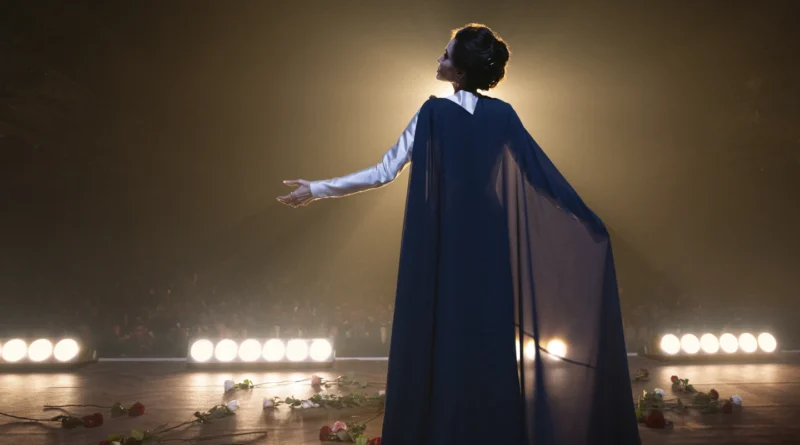Movie Review: Angelina Jolie is graceful and sharp as opera star Maria Callas in ‘Maria’
Angelina Jolie glides through the final days of Maria Callas’ short life in Pablo Larraín’s “Maria,” a dramatic, evocative elegy to the famed soprano. It’s an affair that’s at turns melancholy, biting and grandly theatrical, an aria for a once in a generation star.
Reality is of little consequence on the stage and in “Maria.” It’s all about the raw feeling, which serves the movie well, more dream than history lesson about La Callas. Early on, she pops some Mandrax and tells her devoted butler Ferruccio (a simply wonderful Pierfrancesco Favino) that a television crew is on the way. Are they real, he wonders.
“As of this morning, what is real and what is not real is my business,” she says calmly and definitively, making a feast out of Steven Knight’s sharp script. It’s one of many great lines and moments for Jolie, whose intensity and resolve belie her fragile appearance. And it’s a signal to the audience as well: Don’t fret about dull facts or that Jolie doesn’t really resemble Callas all that much. This is a biopic as opera — an emotional journey fitting of the great diva, full of flair, beauty, betrayal, revelations and sorrow.
In “Maria,” we are the companion to a protagonist with an ever-loosening grip on reality, walking with her through Paris, and her life, for one week in September 1977.
The images from cinematographer Ed Lachman, playfully shifting in form and style, take us on a scattershot journey through her triumphs on stage, her scandalous romance with Aristotle Onassis (Haluk Bilginer) and her traumatic youth. In the present, at age 53, she sleeps till midday, drinks the minimal calories she ingests, goes to restaurants where the waiters know her name looking for adulation and has visions of performances staged just for her all around the city.
Callas is always immaculately dressed and assured, whether reflecting to the imagined news crew (led by Kodi Smit-McPhee) or attempting to find her voice again. Her instrument had famously diminished, leaving her wondering what’s left to live for. The only consistent praise she gets is from her obedient housemaid Bruna (Alba Rohrwacher). It’s no secret that the destination is death. And you suspect that she knows quite well that everything will be a big dimmer when her spotlight is turned off.
Larraín has made a lasting mark on cinema with his unofficial trilogy about these famous women with tragic narratives. With “Jackie,”“Spencer” and now “Maria,” his films are also an unintentional antidote to Ryan Murphy’s stranglehold of the grand dames of recent history, which are all style and scandal and little substance. And yet Larraín’s films are not for everyone. If “Jackie” and “Spencer” did not speak to you, did not show those women as you hoped they would, “Maria” will not turn you into a believer. Three movies in, it seems that audiences are either very on board with his vision or not. There is little room for an in between.
And yet it’s hard to deny that his films are incredible showcases for actors. Jolie as a movie star is somehow both omnipresent and elusive, and lately she chooses to step in front of the camera all too infrequently. Sometimes you wish she could just follow in Nicole Kidman’s footsteps, for whom quantity does not seem to ever jeopardize quality, and she seems to be having fun doing it all, all the time. Perhaps it’s because performances like Jolie’s in “Maria” look so all-consuming.
In the film, Maria scolds a fan for daring to question that she faked sickness to miss a performance. He doesn’t understand the total commitment of body and soul required to make it look effortless, which is probably true. Jolie is not so dramatic, at least publicly, about what it takes to create art. But here the lines blur: Character and actor blend so seamlessly, so ferociously, that you leave not just with heightened empathy for La Callas but Jolie as well.
In one of the film’s few regrettable scenes, she’s put face to face with John F. Kennedy (no fault of Caspar Phillipson), whose wife has caught the greedy eye of Onassis. As a testament to the power of Jolie and the script, you almost forgive yet another JFK impersonation for giving her one of the great brushoffs to utter, romantic and withering all at once. Is it all a little much? Of course, but that’s kind of the point of Maria.
“Maria,” a Netflix release in select theaters now and streaming Dec. 11, is rated R by the Motion Picture Association for “a sexual reference, some language.” Running time: 122 minutes. Three stars out of four.
